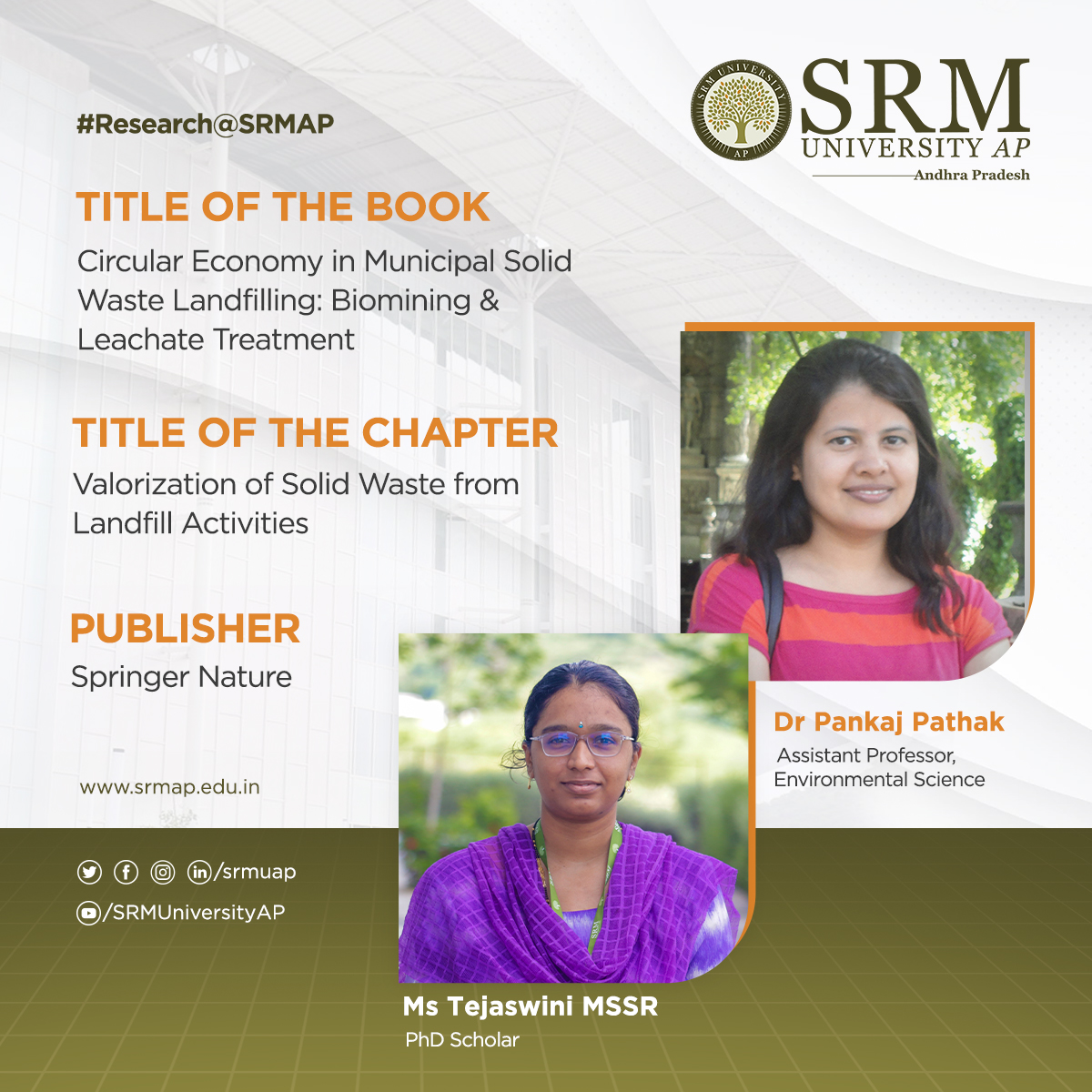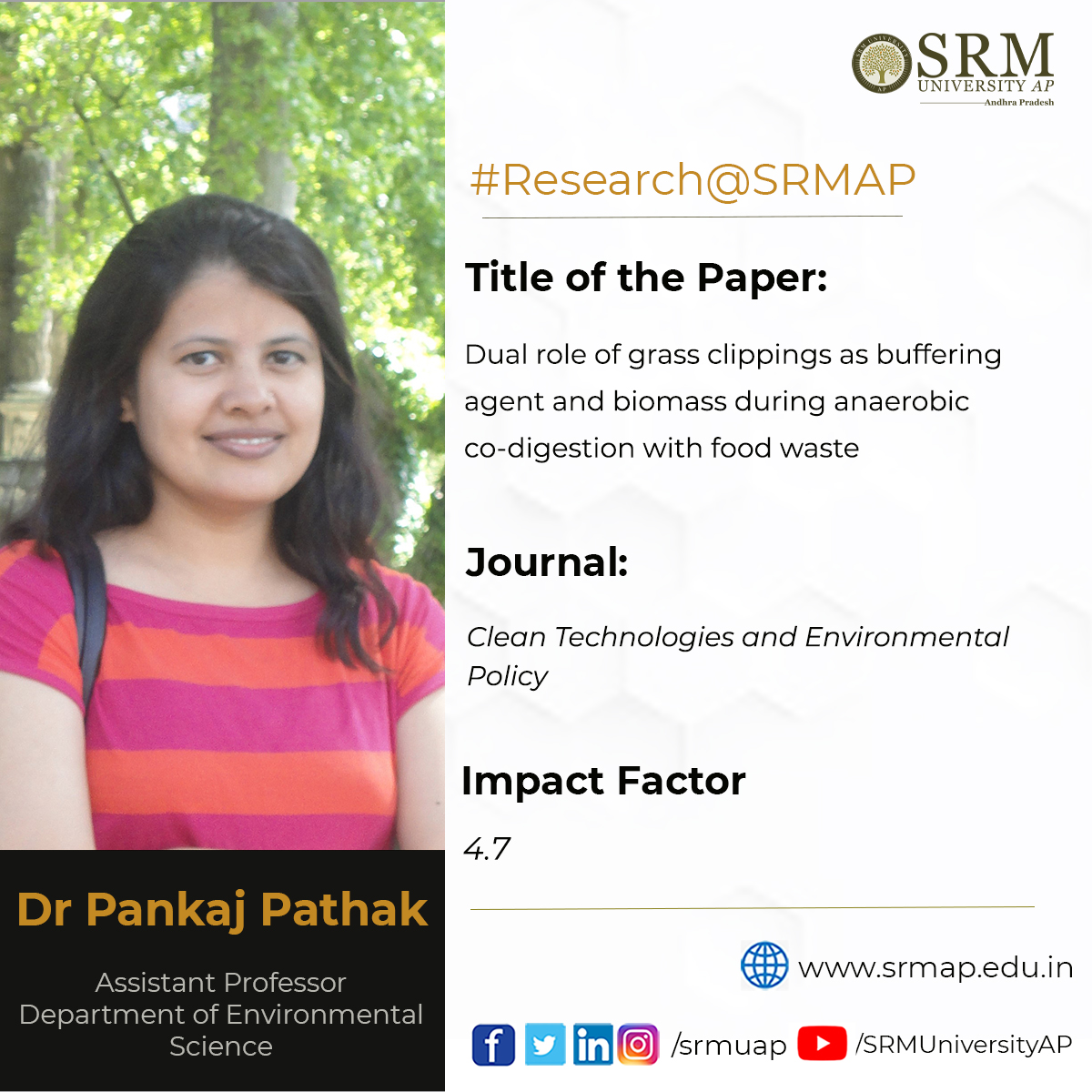Current Happenings ENVS News
- Dr Pankaj Pathak co-edited and authored in the springer publication series September 5, 2022

Dr Pankaj Pathak, Assistant Professor, Department of Environmental Science co-edited the book “Circular Economy in Municipal Solid Waste Landfilling: Biomining & Leachate Treatment: Sustainable Solid Waste Management: Waste to Wealth” in collaboration with Prof Sankar Ganesh Palani from BITS Pilani, Hyderabad. The book was released as part of the Springer publication series ‘Radionuclides and Heavy Metals in the Environment’ that covers issues pertaining to environmental pollution of air, water and soil, causative toxic agents, including radioactive materials, and remediation strategies.
The book is a ready reckoner of contemporary information regarding municipal solid waste landfill biomining, treatment of landfill leachate and heavy metals in a single platform. Construction of new landfills which requires huge monetary investments can be avoided if old landfills were bio-mined for resources and the space can be re-used as new landfills. Landfill leachate is a hazardous waste which needs proper treatment that could generate value-added products such as clean energy and biofertilizers. The book is a rich repository of information for academicians, researchers, and students at master’s and doctoral levels to understand the current trends in municipal solid waste landfill operations.
It also features the chapter, ”Valorization of Solid Waste from Landfill Activities” co-authored by Dr Pankaj Pathak and her PhD scholar MSSR Tejaswini along with Prof Sankar Ganesh Palani and Dr Prangya Ranjan Rout from Thapar Institute of Engineering and Technology. The article states that urban mining of various types of landfill wastes helps in the conservation of natural resources as well as increases the economic value of the disposed of wastes. It also ensures maximum recovery from the wastes that can be used as a secondary raw material for production purposes. Accordingly, they determine the environmental impacts associated with landfill wastes and identify different technologies that would help in the conversion of waste into resources through urban mining.
Essentially the book provides a circular economy approach to municipal solid waste (MSW) management. It also reviews the current technologies and future trends in MSW treatment by focusing on technological solutions for MSW treatment in developing countries in comparison with developed countries.
Continue reading → - Effect of grass clippings on anaerobic co-digestion of food waste August 22, 2022
 The different dimensions of sustainable waste management have always been explored by researchers all over the world. Assistant Professor Dr Pankaj Pathak, Department of Environmental Science, has been actively involved in this research area for a while. Her paper titled Dual role of grass clippings as buffering agent and biomass during anaerobic co digestion with food waste is published in the journal Clean Technologies and Environmental Policy with an impact factor 4.7. Dr Pankaj Pathak co-authored the paper with Debkumar Chakraborty, Sankar Ganesh Palani, M M Ghangrekar, and N Anand.
The different dimensions of sustainable waste management have always been explored by researchers all over the world. Assistant Professor Dr Pankaj Pathak, Department of Environmental Science, has been actively involved in this research area for a while. Her paper titled Dual role of grass clippings as buffering agent and biomass during anaerobic co digestion with food waste is published in the journal Clean Technologies and Environmental Policy with an impact factor 4.7. Dr Pankaj Pathak co-authored the paper with Debkumar Chakraborty, Sankar Ganesh Palani, M M Ghangrekar, and N Anand.Abstract
There is a dire need to replace the chemical buffers that regulate the redox environment in single-stage anaerobic digestion of food waste. Hence, the applicability of grass clippings as an eco-friendly buffering agent and biomass during the anaerobic co-digestion of food waste was explored. A focus was primarily given on the effects of grass clippings on the redox environment and acidogenesis. Concomitantly the production of volatile fatty acids, hydrogen, and methane in mesophilic conditions was monitored. Organic load and substrate-to-inoculum ratio were kept constant in all the experiments, and no chemical buffer was used. The results revealed that the redox environment was regulated with 10% grass clippings by inhibiting rapid pH drop in the digester. The addition of 2, 4, and 6% grass clippings promoted acidogenesis with increased production of acetic and butyric acids, whereas 8 and 10% grass clippings promoted solventogenesis with ethyl alcohol production. Hydrogen generation from the experiments with grass clippings was in the range of 27–30% of the total biogas, which was marginally higher than the control (25%). Methane concentration was negligible in the biogas generated from all experiments. The acidification rate, VFA production/consumption rate, specific hydrogen yield, hydrogen conversion efficiency, and volatile solids removal were maximum and minimum in the reactors with 6 and 10% grass clippings, respectively. From the above results, it can be concluded that adding grass clippings to food waste would regulate the sudden pH changes and enhance the production of value-added biochemicals, making the process cost-effective.
Continue reading →

